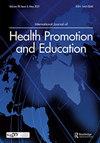What are we going to do about obesity?
IF 0.7
Q3 EDUCATION, SCIENTIFIC DISCIPLINES
International Journal of Health Promotion and Education
Pub Date : 2022-03-04
DOI:10.1080/14635240.2022.2052539
引用次数: 0
Abstract
The problem we have with obesity is well known. In the UK, around 63% of the adult population are above a healthy weight and for children the statistics are even more disturbing. One in three children leaving primary school in the UK are overweight according to government figures (HM Government 2020). The UK is not alone, and according to the World Health Organisation, in 2016, there were 1.9 billion adults aged 18 and over globally who were overweight. Obesity is now not an issue solely seen in high-income countries, but according to the World Health Organisation (WHO 2021), only sub-Saharan Africa and Asia have more people underweight than overweight or obese. The health consequences of being overweight and obese are also well known, including increased risk of cardiovascular disease, diabetes, musculoskeletal disease and some cancers. As has been seen during the current pandemic, we know that being overweight or obese also increases the risk of being seriously ill or dying from Coronavirus. The effects of obesity on individuals, groups and communities include increased hospital admissions, reduced ability to complete activities of daily living and impact on lifestyle. Poor diet and physical inactivity are major risks contributing to obesity (The Health Foundation 2022), and so the answers to prevent and reverse this trend are clear. Whichever way this is achieved, the answer lies in reducing calorie intake, especially from high fat, sugar and salt (HFSS) foods, and undertaking regular activity and exercise. WHO recommends 60 minutes of physical activity per day for children and 150 minutes per week for adults (WHO 2021). In the UK, government policy is focussing on support using evidence-based tools and apps to advise people on losing weight, including weight management programmes offered by the UK National Health Service (NHS). Supporting individual behaviour change can be useful. However, unless there is focussed and appropriate legislation, the problem will not be addressed.This was the experience prior to the smoking ban legislation agreed by many countries over two decades ago. The UK government is discussing banning television advertising of specific foods before the 9 pm watershed. They are also considering bringing in legislation that will place responsibility on food businesses to provide enhanced food labelling by identifying the number of calories in the foods they sell to customers and for retail outlets to restrict volume promotions of HFSS foods, e.g. the ‘buy one get one free’ schemes that some supermarkets offer. However, these proposals continue to focus on the behaviour change approach putting the emphasis on individual action. The UK government commissioned an independent report on food production and the National Food Strategy, Part Two, was published last year (Dimbleby 2021). This identified 14 recommendations that cover areas of food production and consumption, including agriculture, food manufacture, retail and trade, education, health, research and INTERNATIONAL JOURNAL OF HEALTH PROMOTION AND EDUCATION 2022, VOL. 60, NO. 2, 127–129 https://doi.org/10.1080/14635240.2022.2052539我们该如何应对肥胖?
我们的肥胖问题是众所周知的。在英国,大约63%的成年人体重超过健康水平,而对于儿童来说,统计数据更令人不安。根据政府数据(英国政府2020),在英国,每三名小学毕业生中就有一人超重。英国并不是唯一一个超重的国家,根据世界卫生组织的数据,2016年,全球有19亿18岁及以上的成年人超重。肥胖现在不仅仅是高收入国家的问题,但根据世界卫生组织(世界卫生组织2021)的数据,只有撒哈拉以南非洲和亚洲的体重不足者多于超重或肥胖者。超重和肥胖对健康的影响也是众所周知的,包括心血管疾病、糖尿病、肌肉骨骼疾病和某些癌症的风险增加。正如在当前疫情期间所看到的那样,我们知道超重或肥胖也会增加患重病或死于冠状病毒的风险。肥胖对个人、群体和社区的影响包括住院人数增加、完成日常生活活动的能力下降以及对生活方式的影响。不良饮食和缺乏运动是导致肥胖的主要风险(健康基金会2022),因此预防和扭转这一趋势的答案是明确的。无论以何种方式实现这一目标,答案都在于减少热量摄入,尤其是高脂肪、高糖和高盐食物的热量摄入,并定期进行活动和锻炼。世界卫生组织建议儿童每天锻炼60分钟,成人每周锻炼150分钟(世界卫生组织2021)。在英国,政府政策的重点是支持使用循证工具和应用程序为人们提供减肥建议,包括英国国家医疗服务体系(NHS)提供的体重管理计划。支持个人行为的改变是有用的。然而,除非有重点和适当的立法,否则这个问题不会得到解决。这是20多年前许多国家达成禁烟立法之前的经验。英国政府正在讨论在晚上9点之前禁止特定食品的电视广告。他们还考虑引入立法,让食品企业有责任通过识别向顾客出售的食品中的卡路里含量来提供强化食品标签,并让零售店限制HFSS食品的批量促销,例如一些超市提供的“买一送一”计划。然而,这些建议继续侧重于行为改变方法,强调个人行动。英国政府委托编写了一份关于粮食生产的独立报告,《国家粮食战略第二部分》于去年出版(Dimbleby 2021)。这确定了14项建议,涵盖食品生产和消费领域,包括农业、食品制造、零售和贸易、教育、卫生、研究和《2022年国际健康促进与教育杂志》第60卷第2期,127-129https://doi.org/10.1080/14635240.2022.2052539
本文章由计算机程序翻译,如有差异,请以英文原文为准。
求助全文
约1分钟内获得全文
求助全文
来源期刊

International Journal of Health Promotion and Education
EDUCATION, SCIENTIFIC DISCIPLINES-
CiteScore
2.30
自引率
10.00%
发文量
69
 求助内容:
求助内容: 应助结果提醒方式:
应助结果提醒方式:


